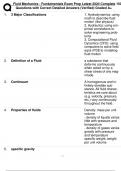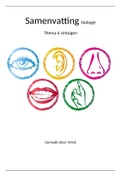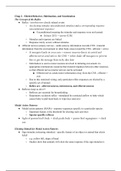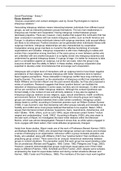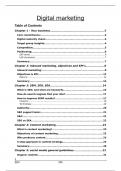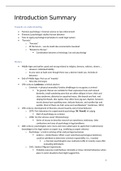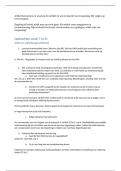Controversies In Psychology – Summary of Literature
Week 1
1. Jennings, R. C. (1988). Leviathan and the air-pump: Hobbes, Boyle, and the
experimental life. The British Journal for the Philosophy of Science, 39(3), 403–410.
2. Aalbers, D. & Teo, T. (2017). The American Psychological Association and the torture
complex: A phenomenology of the banality and workings of bureaucracy, Journal für
Psychologie, 25, 1, 179-199 (please, focus on pages 195-198).
3. Borsboom, D. & Wagenmakers, E.J. (2012), Derailed: The Rise and Fall of Diederik
Stapel. December27, https://www.psychologicalscience.org/observer/derailed-the-
rise-and-fall- of-diederik-stapel
4. Machamer, P. K., Pera, M., & Baltas, A. (2000). Scientific controversies: philosophical
and historical perspectives. Oxford University Press.
Week 2
1. Piechowski-Jozwiak, B., & Bogousslavsky, J. (2014). Hypnosis and the Nancy quarrel.
In: J. Bogousslavsky (pp. 56-64), Hysteria: The Rise of an Enigma. Karger (Series:
Frontier of Neurology and Neuroscience vol 35). (1 book chapter)
2. Hacking: Multiple personalities, internal controversies, and invisible marvels (chapter
12, pp. 213-229). In: Machamer, P. K., Pera, M., & Baltas, A. (2000). Scientific
controversies: philosophical and historical perspectives. Oxford University Press.
Week 3
1. Shaughnessy, M.F. & Fickling, C.L. (1993). testing for giftedness:
the pros, cons and concern, Gifted Education International 1993 Vol. 9, p. 82-84
2. Roige, A. (2014, April 29). Intelligence and IQ testing.
3. Mülberger, A. (2020). Biographies of a scientific subject: the intelligence test. Oxford
Research Encyclopedia for History of Contemporary Psychology.
Week 4
1. Szollosi, A., Kellen, D., Navarro, D., Shiffrin, R., van Rooij, I., Van Zandt, T., & Donkin,
C. (2019). Is preregistration worthwhile?
2. Whitaker, K., & Guest, O. (2020). # bropenscience is broken science: Kirstie Whitaker
and Olivia Guest ask how open science really is. The psychologist
3. Peterson, D., & Panofsky, A. (2020, August 4). Metascience as a scientific social
movement
Week 5
1. Gelman, A. (2016, July 5). Gremlins in the work of Amy J. C. Cuddy, Michael I. Norton,
and Susan T. Fiske.
, 2. Fiske, S. T. (2016, November 1). A Call to Change Science’s Culture of Shaming.
3. Chambers, C. (2017, August 5). Why I hate the ‘tone debate’ in psychology and you
should too.
4. Derksen, M., & Field, S. (2022). The Tone Debate: Knowledge, Self, and Social Order.
Review of General Psychology, 26(2), 172–183.
Week 6
1. Gelo, O., Braakmann, D., & Benetka, G. (2008). Quantitative and Qualitative
Research: Beyond the Debate. Integrative Psychological and Behavioral Science
2. Marecek, J. (2003). Dancing through minefields: Toward a qualitative stance in
psychology. In Qualitative research in psychology: Expanding perspectives in
methodology and design (pp. 49–69). American Psychological Association. (Please,
focus on pp. 49-55 and 62-65)
3. Morgan, M.J. (1998). Qualitative research - science or pseudo-science? The
Psychologist, 11, 481-483; (& the Postscript, p. 488).
4. Norman, G. (2017). Generalization and the qualitative–quantitative debate.
Advances in Health Sciences Education, 22(5), 1051–1055.
,WEEK 1
1. Jennings, R. C. (1988). Leviathan and the air-pump: Hobbes, Boyle, and the
experimental life. The British Journal for the Philosophy of Science, 39(3), 403–410.
https://rug.on.worldcat.org/oclc/4643934003
The book, by Shapin and Schaffer, examines the conflicts over the value and propriety of
experimental methods between two major seventeenth-century thinkers:
Thomas Hobbes -> author of the political treatise Leviathan and strong critic of
systematic experimentation in natural philosophy
Robert Boyle -> mechanical philosopher and owner of the newly invented air-pump.
Experiments became a popular way to obtain knowledge. How experiments became the
foundation of being sure about something and accepting it as the truth.
We are used to thinking of science as an objective study, intellectually independent
of wider social or political issues.
For us, science is practiced within the scientific community, and the methods used,
and truths achieved by science are rational and objective practices and products of
that community, unaffected (ideally) by extra-scientific social, political, or
philosophical events.
This way of regarding science, this form of scientific life, is not 'natural' it is not the
way things have always been. Instead, it is a form of life that had its origins in the
17th Century and had to be worked for, argued for, and defended, because it was
not universally accepted as the right way of doing things.
-> Science and empiricism as we know it is rarely criticized philosophically. This book is a
study of the origins of the Leviathan (Hobbes) and the air-pump (Boyle).
Central to the discussion of Leviathan and the Air-Pump is Hobbes's Dialogus Physicus in
which Hobbes responds to Boyle's New Experiments Physico-Mechanical of 1660.
it provides the coherent philosophical alternative to the experimental programme
and arguments with which to defend that alternative.
One major effort in the book is the definition of a vacuum. Boyle proposes that a vacuum a
space void of air, whereas the traditional definition meant it was void of any body – which is
unnatural because of the lack of experimental consequences, leaving it unresolved.
A second major effort was in the social organization of experimentation. Within Boyle's
programme, the experiments were supposed to exhibit unproblematic and self-evident facts
that provided the secure foundation of knowledge. But instead of treating the facts as self-
evident or self-explanatory, Shapin and Schaffer believe that facts depend on social
conventions.
The general problem of replication is the mutual interdependence of two judgments,
whether the apparatus is working and what phenomena it exhibits when it is working. The
success of replicating Boyle's experiments depended on the criterion used to determine
whether the air-pump was working or not. And the decision as to whether the pump was
working or not depended crucially on whether it could replicate Boyle's phenomena.
, Why Boyle’s philosophy trumped Hobbes’ is argued by Shapin and Schaffer due to the
political and social context of the time.
2. Aalbers, D. & Teo, T. (2017). The American Psychological Association and the torture
complex: A phenomenology of the banality and workings of bureaucracy, Journal für
Psychologie, 25, 1, 179-199 (please, focus on pages 195-198).
https://www.researchgate.net/publication/315817015
The Hoffman report: (David Hoffman, 2015)
The APA collaborated with the CIA
colluded with the Pentagon (headquarter of the Department of Defence)
to curry favour with these agencies and to protect and expand the role of
psychologists in the interrogation programs of the CIA and Department of Defence.
Further, the report also concluded that APA continued to work with the Pentagon
even as credible evidence surfaced that psychologists were designing tortures.
Conclusion: that APA’s principal motive in doing so was to align APA and curry favour
with DoD.…to create a good public-relations response, and to keep the growth of
psychology unrestrained in this area
KUBARK Interrogation Manual
Developed by psychology professors
manual contains a section on the interrogation of »resistant sources« that includes
advice on how to administer »the principal coercive techniques of interrogation:
arrest, detention, deprivation of sensory stimuli through solitary confinement or
similar methods, threats and fear, debility, pain, heightened suggestibility and
hypnosis, narcosis, and induced regression
The techniques were based on the work of a group of Cold War social scientists who
analyzed the Soviet interrogation program.
o These scholars went through a remarkable transformation as part of their
entanglements with the CIA (see also Solovey & Cravens, 2012). In the mid
1950’s they first published their analyses of the Soviet torture program and
were clearly disturbed by the techniques and took great pains to explain that
these techniques were uniquely the product of communist regimes. Hinkle
and Wolff (1957) were careful to explain that such inhumane treatment is
only possible in regimes where legal protections are meaningless. Biderman
(1957), reflecting on the irrationality of the use of a set of techniques known
to produce false confessions to uncover ‘truth’ lets his readers know that this
irrationality is reflective of the irrationalities of communist regimes.
The structure of the APA remains a bureaucracy untouched. While some of the most
important actors mentioned in the Hoffman Report have resigned or have been fired, the
structures that gave power to their actions, and to their mission, have remained in place.
Unless the APA transforms its governing body into a deliberative one, and unless it returns
decision-making power to the elected leadership, a return to a strong relationship between
the DoD and APA may be inevitable
Week 1
1. Jennings, R. C. (1988). Leviathan and the air-pump: Hobbes, Boyle, and the
experimental life. The British Journal for the Philosophy of Science, 39(3), 403–410.
2. Aalbers, D. & Teo, T. (2017). The American Psychological Association and the torture
complex: A phenomenology of the banality and workings of bureaucracy, Journal für
Psychologie, 25, 1, 179-199 (please, focus on pages 195-198).
3. Borsboom, D. & Wagenmakers, E.J. (2012), Derailed: The Rise and Fall of Diederik
Stapel. December27, https://www.psychologicalscience.org/observer/derailed-the-
rise-and-fall- of-diederik-stapel
4. Machamer, P. K., Pera, M., & Baltas, A. (2000). Scientific controversies: philosophical
and historical perspectives. Oxford University Press.
Week 2
1. Piechowski-Jozwiak, B., & Bogousslavsky, J. (2014). Hypnosis and the Nancy quarrel.
In: J. Bogousslavsky (pp. 56-64), Hysteria: The Rise of an Enigma. Karger (Series:
Frontier of Neurology and Neuroscience vol 35). (1 book chapter)
2. Hacking: Multiple personalities, internal controversies, and invisible marvels (chapter
12, pp. 213-229). In: Machamer, P. K., Pera, M., & Baltas, A. (2000). Scientific
controversies: philosophical and historical perspectives. Oxford University Press.
Week 3
1. Shaughnessy, M.F. & Fickling, C.L. (1993). testing for giftedness:
the pros, cons and concern, Gifted Education International 1993 Vol. 9, p. 82-84
2. Roige, A. (2014, April 29). Intelligence and IQ testing.
3. Mülberger, A. (2020). Biographies of a scientific subject: the intelligence test. Oxford
Research Encyclopedia for History of Contemporary Psychology.
Week 4
1. Szollosi, A., Kellen, D., Navarro, D., Shiffrin, R., van Rooij, I., Van Zandt, T., & Donkin,
C. (2019). Is preregistration worthwhile?
2. Whitaker, K., & Guest, O. (2020). # bropenscience is broken science: Kirstie Whitaker
and Olivia Guest ask how open science really is. The psychologist
3. Peterson, D., & Panofsky, A. (2020, August 4). Metascience as a scientific social
movement
Week 5
1. Gelman, A. (2016, July 5). Gremlins in the work of Amy J. C. Cuddy, Michael I. Norton,
and Susan T. Fiske.
, 2. Fiske, S. T. (2016, November 1). A Call to Change Science’s Culture of Shaming.
3. Chambers, C. (2017, August 5). Why I hate the ‘tone debate’ in psychology and you
should too.
4. Derksen, M., & Field, S. (2022). The Tone Debate: Knowledge, Self, and Social Order.
Review of General Psychology, 26(2), 172–183.
Week 6
1. Gelo, O., Braakmann, D., & Benetka, G. (2008). Quantitative and Qualitative
Research: Beyond the Debate. Integrative Psychological and Behavioral Science
2. Marecek, J. (2003). Dancing through minefields: Toward a qualitative stance in
psychology. In Qualitative research in psychology: Expanding perspectives in
methodology and design (pp. 49–69). American Psychological Association. (Please,
focus on pp. 49-55 and 62-65)
3. Morgan, M.J. (1998). Qualitative research - science or pseudo-science? The
Psychologist, 11, 481-483; (& the Postscript, p. 488).
4. Norman, G. (2017). Generalization and the qualitative–quantitative debate.
Advances in Health Sciences Education, 22(5), 1051–1055.
,WEEK 1
1. Jennings, R. C. (1988). Leviathan and the air-pump: Hobbes, Boyle, and the
experimental life. The British Journal for the Philosophy of Science, 39(3), 403–410.
https://rug.on.worldcat.org/oclc/4643934003
The book, by Shapin and Schaffer, examines the conflicts over the value and propriety of
experimental methods between two major seventeenth-century thinkers:
Thomas Hobbes -> author of the political treatise Leviathan and strong critic of
systematic experimentation in natural philosophy
Robert Boyle -> mechanical philosopher and owner of the newly invented air-pump.
Experiments became a popular way to obtain knowledge. How experiments became the
foundation of being sure about something and accepting it as the truth.
We are used to thinking of science as an objective study, intellectually independent
of wider social or political issues.
For us, science is practiced within the scientific community, and the methods used,
and truths achieved by science are rational and objective practices and products of
that community, unaffected (ideally) by extra-scientific social, political, or
philosophical events.
This way of regarding science, this form of scientific life, is not 'natural' it is not the
way things have always been. Instead, it is a form of life that had its origins in the
17th Century and had to be worked for, argued for, and defended, because it was
not universally accepted as the right way of doing things.
-> Science and empiricism as we know it is rarely criticized philosophically. This book is a
study of the origins of the Leviathan (Hobbes) and the air-pump (Boyle).
Central to the discussion of Leviathan and the Air-Pump is Hobbes's Dialogus Physicus in
which Hobbes responds to Boyle's New Experiments Physico-Mechanical of 1660.
it provides the coherent philosophical alternative to the experimental programme
and arguments with which to defend that alternative.
One major effort in the book is the definition of a vacuum. Boyle proposes that a vacuum a
space void of air, whereas the traditional definition meant it was void of any body – which is
unnatural because of the lack of experimental consequences, leaving it unresolved.
A second major effort was in the social organization of experimentation. Within Boyle's
programme, the experiments were supposed to exhibit unproblematic and self-evident facts
that provided the secure foundation of knowledge. But instead of treating the facts as self-
evident or self-explanatory, Shapin and Schaffer believe that facts depend on social
conventions.
The general problem of replication is the mutual interdependence of two judgments,
whether the apparatus is working and what phenomena it exhibits when it is working. The
success of replicating Boyle's experiments depended on the criterion used to determine
whether the air-pump was working or not. And the decision as to whether the pump was
working or not depended crucially on whether it could replicate Boyle's phenomena.
, Why Boyle’s philosophy trumped Hobbes’ is argued by Shapin and Schaffer due to the
political and social context of the time.
2. Aalbers, D. & Teo, T. (2017). The American Psychological Association and the torture
complex: A phenomenology of the banality and workings of bureaucracy, Journal für
Psychologie, 25, 1, 179-199 (please, focus on pages 195-198).
https://www.researchgate.net/publication/315817015
The Hoffman report: (David Hoffman, 2015)
The APA collaborated with the CIA
colluded with the Pentagon (headquarter of the Department of Defence)
to curry favour with these agencies and to protect and expand the role of
psychologists in the interrogation programs of the CIA and Department of Defence.
Further, the report also concluded that APA continued to work with the Pentagon
even as credible evidence surfaced that psychologists were designing tortures.
Conclusion: that APA’s principal motive in doing so was to align APA and curry favour
with DoD.…to create a good public-relations response, and to keep the growth of
psychology unrestrained in this area
KUBARK Interrogation Manual
Developed by psychology professors
manual contains a section on the interrogation of »resistant sources« that includes
advice on how to administer »the principal coercive techniques of interrogation:
arrest, detention, deprivation of sensory stimuli through solitary confinement or
similar methods, threats and fear, debility, pain, heightened suggestibility and
hypnosis, narcosis, and induced regression
The techniques were based on the work of a group of Cold War social scientists who
analyzed the Soviet interrogation program.
o These scholars went through a remarkable transformation as part of their
entanglements with the CIA (see also Solovey & Cravens, 2012). In the mid
1950’s they first published their analyses of the Soviet torture program and
were clearly disturbed by the techniques and took great pains to explain that
these techniques were uniquely the product of communist regimes. Hinkle
and Wolff (1957) were careful to explain that such inhumane treatment is
only possible in regimes where legal protections are meaningless. Biderman
(1957), reflecting on the irrationality of the use of a set of techniques known
to produce false confessions to uncover ‘truth’ lets his readers know that this
irrationality is reflective of the irrationalities of communist regimes.
The structure of the APA remains a bureaucracy untouched. While some of the most
important actors mentioned in the Hoffman Report have resigned or have been fired, the
structures that gave power to their actions, and to their mission, have remained in place.
Unless the APA transforms its governing body into a deliberative one, and unless it returns
decision-making power to the elected leadership, a return to a strong relationship between
the DoD and APA may be inevitable




